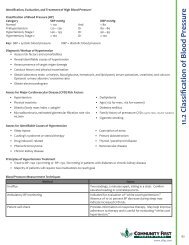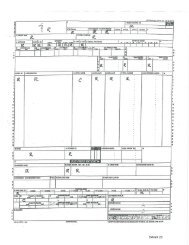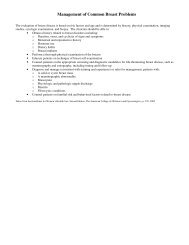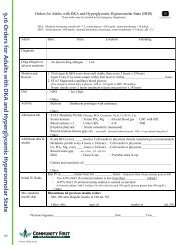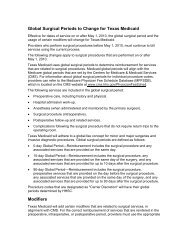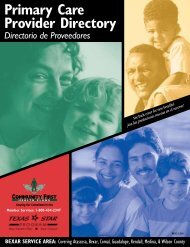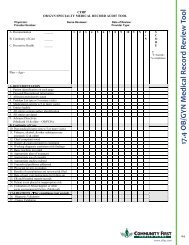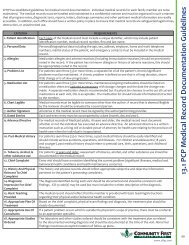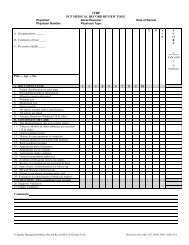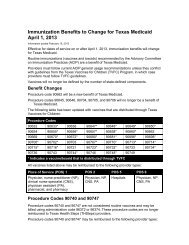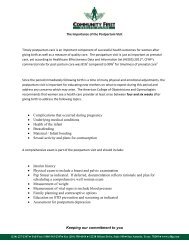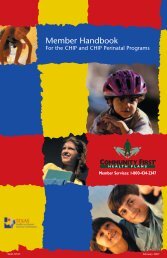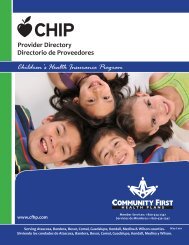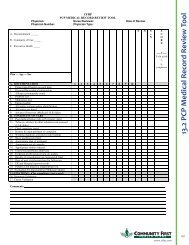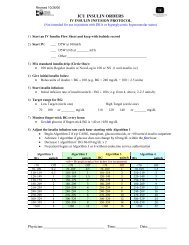Full Clinical Guidelines - Community First Health Plans.
Full Clinical Guidelines - Community First Health Plans.
Full Clinical Guidelines - Community First Health Plans.
Create successful ePaper yourself
Turn your PDF publications into a flip-book with our unique Google optimized e-Paper software.
CFHP has adopted the National Asthma Education and Prevention Program Expert Panel Report 3: guidelines for the diagnosis<br />
and management of asthma -2007. This guideline updates a previous version: Expert Panel Report 2: guidelines for the diagnosis<br />
and management of asthma and its update on selected topics in 2002. Bethesda (MD): U.S. Department of <strong>Health</strong> and Human<br />
Services, Public <strong>Health</strong> Service, National Institutes of <strong>Health</strong>, National Heart, Lung and Blood Institute; 1997 JulCopies of the<br />
complete NAEPP guidelines are available at their web site http://www.nhlbi.nih.gov/guidelines/asthma/index.htm or from CFHP.<br />
The 2007 NAEPP Expert Panel identified questions about asthma management in four main catergories: Assesing and<br />
Monitoring Asthma Severity and Asthma Control, Education for a Partnership in Care, Control of Environmental Factors and<br />
Comorbid Conditions that Affect Asthma, and Medications. The <strong>Guidelines</strong> updated guidelines also focused on Stepwise<br />
Approach for Manageing Asthma and Managing Exacerbations. Some key topics in each category include:<br />
• Assessing and Monitoring Asthma Severity and Astma Control<br />
• Utilizes multiple measures of the patient’s level of current impairment and future risks.<br />
• Stress to look for those at high risk for frequent exacerbations even though appear to have low day-to-day effects<br />
of asthma.<br />
• Education for a Partnership in Care<br />
• Patient skills to self-monitor and manage asthma<br />
• Use of a written asthma action plan.<br />
• Recommendations on educational opportunities in a variety of settings<br />
• Clinician education programs to improve patient-provider communication.<br />
• Control of Environmental Factors and Comorbid Conditions that Affect Asthma<br />
• Allergans and Irritants<br />
• Comorbid conditions<br />
• Medications<br />
• General Mechanisms and Role in Therapy<br />
• Delivery Devices for Inhaled Medications<br />
• Safety Issues for Inhaled Cortisosteroids and Long-Acting Beta2–Agonists<br />
• Stepwise Approach for Managing Asthma<br />
• Stepwise Treatment Recommendations for Differnet Ages<br />
1. Steps for Children 0-4 Years of Age<br />
2. Steps for Children 5-11 Years of Age<br />
3. Steps for Youths > 12 Years of Age and Adults<br />
• Manging Special Situations<br />
1. Exercise-Induced Bronchospasm<br />
2. Pregnancy<br />
3. Surgery<br />
4. Disparities<br />
• Managing Exacerbations<br />
• Classifying Severity<br />
• Home Management<br />
• Management in the Urgent or Emergency Care and Hospital Settings<br />
4.1 Asthma Disease Management<br />
The foundation of care for asthma can be summarized in nine key points.<br />
1. Conduct a detailed medical history, physical examination and pulmonary function tests (PFT).<br />
2. Tailor asthma treatment plan to the needs of the individual patient.<br />
3. Provide written self-management plan and tools for self-management.<br />
4. Gain control as quickly as possible; then decrease medication to the least necessary.<br />
5. Provide asthma education to patient and caregivers.<br />
6. Teach proper inhaler technique.<br />
7. Control environmental and other factors contributing to asthma severity.<br />
8. Review treatment every 1 – 6 months, depending on severity. If control is sustained for at least 3 months, consider gradual<br />
reduction in treatment. If control is not achieved, consider step-up in treatment after reviewing patient compliance,<br />
medication use technique and control of allergens/trigger factors.<br />
9. Consultation with an asthma specialist is recommended for unstable or complex patients.<br />
ACAAI Asthma Disease Management Resource Manual, October 1997.<br />
H EALTH PLANS<br />
www.cfhp.com<br />
17



